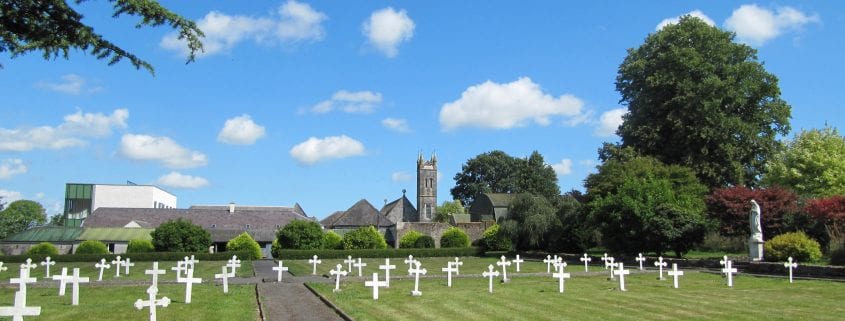Homily for the feast of the Cistercian Founders 2019
We thought it would be good to share with you Dom Augustine’s homily at yesterday’s mass for the feast of the Holy Founders of the Cistercian Order, Saints Robert, Alberic and Stephen. In it, he describes the nature of our life as Cistercians, the journey of prayer and the interior and exterior challenges and joys therein! We thank him for his permission to publish his reflection on this special feast of ours.
Today we celebrate the Solemn Feast of our Holy Founders, Saints Robert, Alberic and Stephen. These men came along at a time of great spiritual searching in the 11th century and gave the monastic tradition a particular form when they built the New Monastery of Citeaux in 1098. At the heart of their search was the desire for an authentic monastic life. That is still the challenge for us today. It is a continuing challenge. So challenging in fact that Jesus says today’s gospel: “For human beings this is impossible, but not for God. All things are possible to God.”
It is no exaggeration to speak of monastic life as the battle-ground where we engage in spiritual warfare not only with the devil but with our own demons also; it is where we wrestle with so many things There can be much anguish and difficulty and suffering and hardship but these are not to be exaggerated for they are part of most authentic lives and certainly not exclusive to monastic life. As we know there is also much joy and inner contentment in the life, far in excess of whatever suffering and hardship may be involved. When we have come through our battles we have gained an invaluable experience.
We have learned that prayer is more than pious consolation and refuge. Monastic life can be the place where we have overcome our fears and faced the loss of all things. Then and only then do we become capable of accepting the hundredfold of this life and find in our communion with our brothers and sisters in Christ the living support we risked in leaving the world behind. Perseverance does eventually meet with success in the fruits of the Spirit. How long does it take for the barren tree to blossom and produce fruits of love, joy, peace, patience etc. Each of us can answer that question in the privacy of our own hearts.
A monastic lifestyle is characterized by four broad components.
- Monks and nuns must be seekers of God. That is what we try to discern in the first instance. They are pilgrims of the Absolute, in search of the transcendent. We describe this in Christian terms as “following Christ” or in the terms used by John Cassian in his First Conference, embracing the Kingdom of Heaven.
- This seeking after something more must inevitably involve a radical renunciation that includes a substantial degree of separation from the world at the level of belief and value. The more radical the monastic lifestyle, the more complete the physical separation. Monastic life at the level we live it must involve the practice of asceticism, i.e., specific practices that, under grace, facilitate the attainment of the ultimate goal (See Cst.25)
- I think we have to offer a holy simplicity to those who are seekers of the absolute, who are seeking to follow Christ. This will be expressed externally in poverty and modesty of material goods, simplicity in its essence is the effect of sustained commitment to a single objective. In a word, My happiness lies in God alone. I am not happy with anything else. Blessed are the pure in heart, they shall see God. That kind of clarity is not attained too quickly; it is a lifelong pursuit as most of us here know only too well. This is what the ancients termed puritas cordis: an undivided heart. Even though he may engage in multiple tasks, a real monk cannot be divided (Cst. 27).
- We become monks by living within an evident tradition. St. Benedict finds it essential that the monastic recruits desire to live a common life under a rule and an abbot so that they do not live by their own judgement or obey their desires and pleasures, but walk according to the judgement and instruction of another. It is in training newcomers to go beyond self-will that monasticism most effectively serves its purpose (Cst. 3).
Many of our Mass readings throughout the year speak of change and continuity. As the song goes, you can’t have one without the other. That is very true. As monks following an ancient Rule we continue to maintain many of our age-old traditions even in the midst of the many changes of our time and in our culture. While experiencing change, sometimes uncomfortable change, we also strive to maintain our traditions because these have come from past generations and have stood the test of time and hopefully will continue well into the future. But that is where we must play our part.
Lastly a word about the most important thing of all: Prayer. To really persevere in our way of life, we must have a quiet satisfaction with the experience of prayer. My happiness lies in God alone. Learning to be quiet and still, to be aware of the God living in the depths of our being, is not easy at the start. But if communities are to survive they must be able to form their members in the inevitable vicissitudes of the contemplative life. Karl Rahner said “The Christian of the future will be a mystic or he will not exist at all.” Monasteries without a strong contemplative ambience and orientation will struggle to stay alive. Those that do survive will be so grounded in contemplative living that they will not be shaken.
– Dom Augustine McGregor ocso



